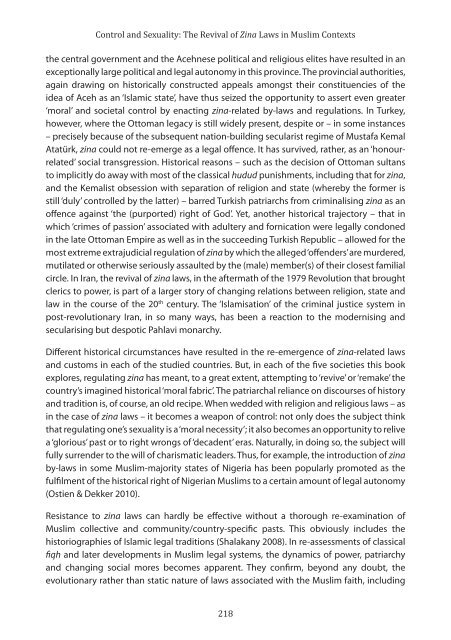control and sexuality
control and sexuality
control and sexuality
- No tags were found...
Create successful ePaper yourself
Turn your PDF publications into a flip-book with our unique Google optimized e-Paper software.
Control <strong>and</strong> Sexuality: The Revival of Zina Laws in Muslim Contextsthe central government <strong>and</strong> the Acehnese political <strong>and</strong> religious elites have resulted in anexceptionally large political <strong>and</strong> legal autonomy in this province. The provincial authorities,again drawing on historically constructed appeals amongst their constituencies of theidea of Aceh as an ‘Islamic state’, have thus seized the opportunity to assert even greater‘moral’ <strong>and</strong> societal <strong>control</strong> by enacting zina-related by-laws <strong>and</strong> regulations. In Turkey,however, where the Ottoman legacy is still widely present, despite or – in some instances– precisely because of the subsequent nation-building secularist regime of Mustafa KemalAtatürk, zina could not re-emerge as a legal offence. It has survived, rather, as an ‘honourrelated’social transgression. Historical reasons – such as the decision of Ottoman sultansto implicitly do away with most of the classical hudud punishments, including that for zina,<strong>and</strong> the Kemalist obsession with separation of religion <strong>and</strong> state (whereby the former isstill ‘duly’ <strong>control</strong>led by the latter) – barred Turkish patriarchs from criminalising zina as anoffence against ‘the (purported) right of God’. Yet, another historical trajectory – that inwhich ‘crimes of passion’ associated with adultery <strong>and</strong> fornication were legally condonedin the late Ottoman Empire as well as in the succeeding Turkish Republic – allowed for themost extreme extrajudicial regulation of zina by which the alleged ‘offenders’ are murdered,mutilated or otherwise seriously assaulted by the (male) member(s) of their closest familialcircle. In Iran, the revival of zina laws, in the aftermath of the 1979 Revolution that broughtclerics to power, is part of a larger story of changing relations between religion, state <strong>and</strong>law in the course of the 20 th century. The ‘Islamisation’ of the criminal justice system inpost-revolutionary Iran, in so many ways, has been a reaction to the modernising <strong>and</strong>secularising but despotic Pahlavi monarchy.Different historical circumstances have resulted in the re-emergence of zina-related laws<strong>and</strong> customs in each of the studied countries. But, in each of the five societies this bookexplores, regulating zina has meant, to a great extent, attempting to ‘revive’ or ‘remake’ thecountry’s imagined historical ‘moral fabric’. The patriarchal reliance on discourses of history<strong>and</strong> tradition is, of course, an old recipe. When wedded with religion <strong>and</strong> religious laws – asin the case of zina laws – it becomes a weapon of <strong>control</strong>: not only does the subject thinkthat regulating one’s <strong>sexuality</strong> is a ‘moral necessity’; it also becomes an opportunity to relivea ‘glorious’ past or to right wrongs of ‘decadent’ eras. Naturally, in doing so, the subject willfully surrender to the will of charismatic leaders. Thus, for example, the introduction of zinaby-laws in some Muslim-majority states of Nigeria has been popularly promoted as thefulfilment of the historical right of Nigerian Muslims to a certain amount of legal autonomy(Ostien & Dekker 2010).Resistance to zina laws can hardly be effective without a thorough re-examination ofMuslim collective <strong>and</strong> community/country-specific pasts. This obviously includes thehistoriographies of Islamic legal traditions (Shalakany 2008). In re-assessments of classicalfiqh <strong>and</strong> later developments in Muslim legal systems, the dynamics of power, patriarchy<strong>and</strong> changing social mores becomes apparent. They confirm, beyond any doubt, theevolutionary rather than static nature of laws associated with the Muslim faith, including218


